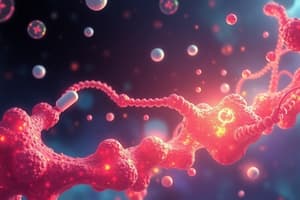Podcast
Questions and Answers
Which suffix indicates a drug that is classified as a beta-adrenergic blocker?
Which suffix indicates a drug that is classified as a beta-adrenergic blocker?
- -pril
- -statin
- -azosin
- -olol (correct)
What is the source of drugs like morphine and nicotine?
What is the source of drugs like morphine and nicotine?
- Animal sources
- Natural sources (correct)
- Synthetic sources
- Mineral sources
Which therapeutic classification is used to lower plasma cholesterol levels?
Which therapeutic classification is used to lower plasma cholesterol levels?
- Anticoagulants
- Hypolipidemic agents (correct)
- Antiarrhythmic
- Antihypertensives
What type of drug classification is based on the mechanism of action?
What type of drug classification is based on the mechanism of action?
Which of the following drugs is characterized by the suffix -cillin?
Which of the following drugs is characterized by the suffix -cillin?
Which category does paracetamol belong to?
Which category does paracetamol belong to?
Which suffix identifies Angiotensin receptor antagonists type 1 (ARAII)?
Which suffix identifies Angiotensin receptor antagonists type 1 (ARAII)?
Which mechanism of action is associated with diuretics?
Which mechanism of action is associated with diuretics?
Which aspect of pharmacology focuses on the manipulation of raw materials?
Which aspect of pharmacology focuses on the manipulation of raw materials?
What does pharmacogenomics study in relation to drugs?
What does pharmacogenomics study in relation to drugs?
In which of the following fields of pharmacology would you study the harmful effects of drugs?
In which of the following fields of pharmacology would you study the harmful effects of drugs?
Which branch of pharmacology aims to evaluate the effects of drugs on humans?
Which branch of pharmacology aims to evaluate the effects of drugs on humans?
What does the term pharmacoeconomics refer to?
What does the term pharmacoeconomics refer to?
Which one of the following is NOT part of the subdivision of pharmacology under 'organism'?
Which one of the following is NOT part of the subdivision of pharmacology under 'organism'?
Which term describes the study of medicinal plants used by indigenous cultures?
Which term describes the study of medicinal plants used by indigenous cultures?
What is the primary aim of rational drug use in pharmacology?
What is the primary aim of rational drug use in pharmacology?
What is a primary aim of clinical pharmacology?
What is a primary aim of clinical pharmacology?
Which of the following is NOT a focus of a pharmacological treatment review?
Which of the following is NOT a focus of a pharmacological treatment review?
What constitutes a significant benefit of effective drug administration?
What constitutes a significant benefit of effective drug administration?
What does pharmacodynamics primarily concern?
What does pharmacodynamics primarily concern?
What is deprescribing?
What is deprescribing?
What is an important consideration in balancing risks and benefits of a medication?
What is an important consideration in balancing risks and benefits of a medication?
What is pharmacology primarily concerned with?
What is pharmacology primarily concerned with?
Which statement about therapeutic compliance is accurate?
Which statement about therapeutic compliance is accurate?
Which adverse effect aspect is commonly focused on in pharmacological treatments?
Which adverse effect aspect is commonly focused on in pharmacological treatments?
Which term best describes a drug?
Which term best describes a drug?
What significant document reflects the early development of pharmacology?
What significant document reflects the early development of pharmacology?
Which field of study primarily intersects with pharmacology?
Which field of study primarily intersects with pharmacology?
What does the term 'pharmacovigilance' refer to?
What does the term 'pharmacovigilance' refer to?
In what way does experimental pharmacology differ from traditional medicinal practices?
In what way does experimental pharmacology differ from traditional medicinal practices?
How has pharmacology evolved with regards to drug development?
How has pharmacology evolved with regards to drug development?
What does the word 'pharmakon' primarily signify in the context of pharmacology?
What does the word 'pharmakon' primarily signify in the context of pharmacology?
What is the first level of the Anatomical Therapeutic Chemical Classification (ATC)?
What is the first level of the Anatomical Therapeutic Chemical Classification (ATC)?
Which type of treatment is exemplified by the use of antibiotics in infections?
Which type of treatment is exemplified by the use of antibiotics in infections?
In the ATC system, what does the third level represent?
In the ATC system, what does the third level represent?
What distinguishes suppressive treatment from prophylactic treatment?
What distinguishes suppressive treatment from prophylactic treatment?
Which statement best defines a medical prescription?
Which statement best defines a medical prescription?
What is the purpose of pathogenic or corrective treatment?
What is the purpose of pathogenic or corrective treatment?
Which of the following is described as functional or symptomatic treatment?
Which of the following is described as functional or symptomatic treatment?
Which classification level would be indicated by two numbers in the ATC system?
Which classification level would be indicated by two numbers in the ATC system?
Study Notes
Introduction to Pharmacology
- Pharmacology is the study of the effects of drugs and chemicals on living organisms.
- A drug is any chemical substance that affects biological systems.
- Pharmacology emerged from an understanding of magic potions and plant-derived remedies/poisons.
- Experimental pharmacology and organic chemistry have played a key role in its development.
Current Pharmacology
- Current pharmacology can be subdivided into three areas: Drug, Organism, and Therapeutic Applications.
- Drug focuses on aspects like pharmacognosy, chemical pharmacology, pharmacotechnics, and ethnopharmacology.
- Organism investigates pharmacokinetics, pharmacodynamics, pharmacometry, pharmacogenomics, and chronopharmacology.
- Therapeutic Applications include clinical pharmacology, pharmacotherapy, toxicology, pharmacoepidemiology, pharmacoeconomics, and gene therapy.
Aims of Pharmacology
- The primary goal of pharmacology is the rational use of drugs: ensuring patients receive appropriate medication at the correct dose, for the proper duration, and at the lowest possible cost.
- This includes achieving a balance between benefits and risks, considering adverse effects, costs, and potential administration problems.
- Another aim is to facilitate a rational therapeutic process by understanding how drugs penetrate the patient (formulations, routes of administration, therapeutic compliance), reach their site of action (pharmacokinetics), and produce the expected pharmacological effect (pharmacodynamics).
- Clinical pharmacology identifies factors that alter drug response, communicates their importance, individualizes treatments, and monitors response to adjust treatment if necessary.
- A final key aim is reviewing pharmacological treatment to optimize its effectiveness, minimize adverse reactions, detect interactions and duplications, improve compliance, enhance efficiency, and differentiate between adverse drug reactions and new pathologies.
Drug Nomenclature
- Drugs are typically classified based on therapeutic utility, mechanism of action, or an anatomical therapeutic chemical classification (ATC) system.
- The ATC system organizes drugs hierarchically: first level (main anatomical group), second level (main therapeutic group), third level (therapeutic/pharmacological subgroup), fourth level (chemical/therapeutic/pharmacological subgroup), and fifth level (chemical).
Types of Pharmacological treatments
- Different types of pharmacological treatments include:
- Aetiological/curative treatment: Targets the cause of the pathological mechanism.
- Pathogenic/corrective treatment: Addresses the pathological mechanism without targeting the cause.
- Prophylactic treatment: Preemptive prevention of disease.
- Suppressive treatment: Temporarily alleviates disease symptoms.
- Functional/symptomatic treatment: Relieves or suppresses disease symptoms.
Medical Prescription
- A medical prescription is a legally required document used by medical professionals to authorize pharmacists to dispense specific prescription drugs to patients.
- It is a formal communication between a healthcare professional and a pharmacist ensuring appropriate drug use.
Studying That Suits You
Use AI to generate personalized quizzes and flashcards to suit your learning preferences.
Related Documents
Description
This quiz explores the fundamentals of pharmacology, including its definition, history, and current subdivisions. It highlights key areas such as drug properties, organism interactions, and therapeutic applications. Test your understanding of how pharmacology influences medical practices today.





